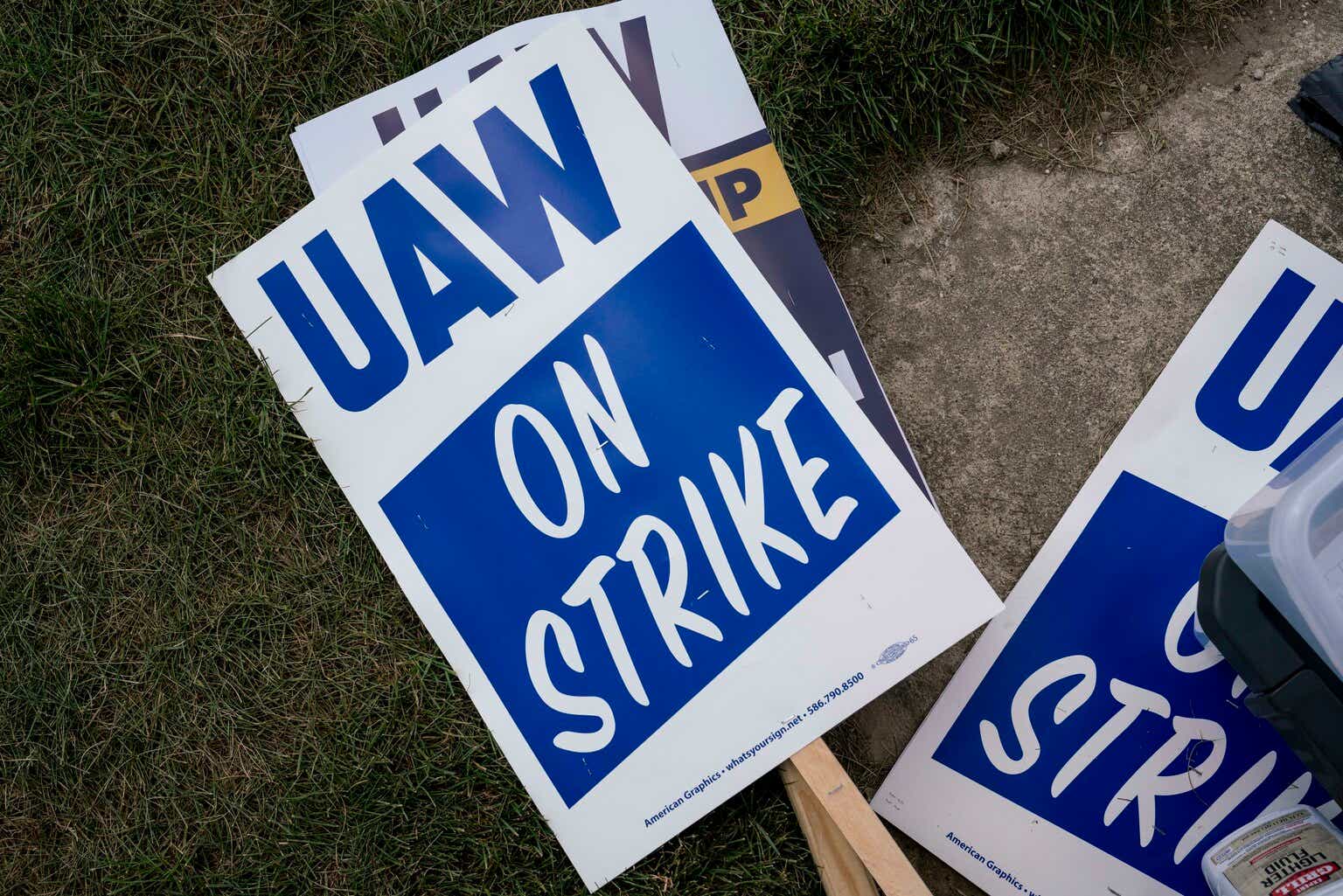By Gianmarco Migliavacca
Strikes targeting the Detroit “Big 3” could maximize disruption and uncertainty, while putting long-term competitiveness at risk.
With the expiration of labor contracts on September 14, the United Auto Workers (UAW) union launched targeted strikes against all three Detroit automakers: General Motors (GM), Ford (F) and Stellantis (STLA).
This followed months of negotiations that narrowed the gap on wages, but left significant distance on nonwage union demands including a 32-hour work week, defined benefit pension reinstatement and improved retiree benefits.
Such issues are a red line for the automakers, given their need to preserve flexibility and cost competitiveness. Absent big concessions from both parties, we think an agreement as unlikely in the near term – a scenario we anticipated in a prior blog.
The unique shape of the strike is a key variable. Rather than target just one company, the UAW took the unprecedented step of striking at all three, selecting a few key plants initially but retaining the option to expand to more, depending on the progress of negotiations.
The union wants to keep the Big 3 guessing as to which plants could be targeted next, making it difficult for them to plan ahead. The strategy also helps preserve the union’s $825 million strike fund, enabling a lengthier strike.
The targeted plants are not the companies’ largest, and together account for less than 10% of the Big 3’s unionized workforce, translating into just a $7 million-per-week depletion of the strike fund.
Still, they affect some of the companies’ most popular and profitable SUVs and pickups, including GM’s Chevrolet Colorado (assembled in Wentzville, MO) and Ford Bronco SUVs from the Michigan assembly plant.
All else equal, the Wentzville strike could trim GM earnings before interest and taxes (EBIT) by roughly 2% in 3Q and 13% in 4Q, with a monthly hit of some $140 million. But that could be just the beginning, as the union may call strikes at bigger, more profitable plants without notice if negotiations stall.
That said, all the Big 3 automakers enter the strike with strong liquidity and metrics that provide substantial financial and ratings headroom; hence, we don’t expect the strike to cause ratings downgrades.
Still, results could take a substantial hit, and annual and multiyear financial targets may need to be revised lower. In meantime, there will be a heavy toll, not only on the parties, but on the entire U.S. auto supply chain – and ultimately consumers – as curtailed supply would likely send car prices higher.
Who stands to benefit? Non-unionized foreign automakers and Tesla (TSLA), which could enjoy better sales amid current disruption and gain a competitive edge over the longer-term relative to the Big 3.
This material is provided for informational purposes only and nothing herein constitutes investment, legal, accounting or tax advice. This material is general in nature and is not directed to any category of investors and should not be regarded as individualized, a recommendation, investment advice or a suggestion to engage in or refrain from any investment-related course of action. Investment decisions and the appropriateness of this material should be made based on an investor’s individual objectives and circumstances and in consultation with his or her advisors. Information is obtained from sources deemed reliable, but there is no representation or warranty as to its accuracy, completeness or reliability. All information is current as of the date of this material and is subject to change without notice. The firm, its employees and advisory accounts may hold positions of any companies discussed. Any views or opinions expressed may not reflect those of the firm as a whole. Neuberger Berman products and services may not be available in all jurisdictions or to all client types. This material may include estimates, outlooks, projections and other “forward-looking statements.” Due to a variety of factors, actual events or market behavior may differ significantly from any views expressed.
Investing entails risks, including possible loss of principal. Investments in hedge funds and private equity are speculative and involve a higher degree of risk than more traditional investments. Investments in hedge funds and private equity are intended for sophisticated investors only. Indexes are unmanaged and are not available for direct investment. Past performance is no guarantee of future results.
This material is being issued on a limited basis through various global subsidiaries and affiliates of Neuberger Berman Group LLC. Please visit www.nb.com/disclosure-global-communications for the specific entities and jurisdictional limitations and restrictions.
The “Neuberger Berman” name and logo are registered service marks of Neuberger Berman Group LLC.
© 2009-2023 Neuberger Berman Group LLC. All rights reserved.
Original Post
Editor’s Note: The summary bullets for this article were chosen by Seeking Alpha editors.
Read the full article here




